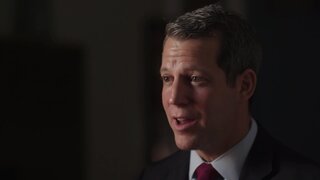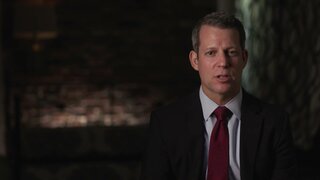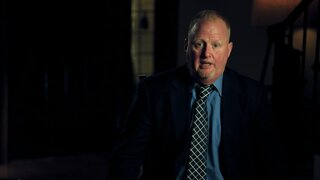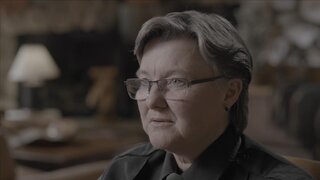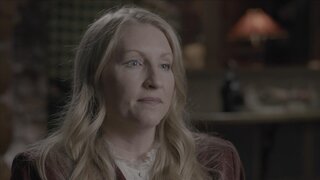Create a free profile to get unlimited access to exclusive videos, breaking news, sweepstakes, and more!
A Multi-Million Dollar Mystery: Was A Lottery Winner’s Sudden Wealth Motive For Murder?
Abraham Shakespeare's financial advisor told relatives that the pressures of wealth drove him into isolation.
A Florida man hit the jackpot after winning millions on a lottery ticket, but had his luck run out when he mysteriously disappeared?
Abraham Shakespeare’s rags-to-riches story begins in his hometown of Plant City, a rural community known for its vast strawberry fields and orange groves. He didn’t have much growing up in the hardscrabble town and worked in the fields to support his family.
“I think he wished and hoped and prayed that he would win the lottery, but Abraham wasn’t a real fortunate person,” Abraham’s friend, Greg Smith, told “Buried in The Backyard,” streaming on Oxygen. “He left school to go to work to see what he could do about helping his family.”
But on Nov. 15, 2006, Abraham and a friend, Michael Ford, stopped at a local convenience store. Abraham handed Ford a few dollars and asked him to buy two lottery tickets. That night, he won $31 million.
Abraham agreed to a payout of $16.9 million and shared his generosity by purchasing homes for his cousins. He also helped his friend Greg Smith, a local barber, pay for a business loan worth $87,000. Smith agreed to pay Abraham in installments to pay off his debts.
“He bought a home in north Lakeland, which was a home he dreamed of,” said David Clark of the Hillsborough County Sheriff’s Department. “It was a small mansion.”
But Abraham, an uneducated man who struggled just to read and write, seemed to be in over his head.
“It was scary because he didn’t know how to manage his money. He had his entourage around him, but half those people, he didn’t know,” Abraham’s cousin Tammy Edom told producers. “They knew he couldn’t read. They knew he couldn’t write. They knew he couldn’t sign nothing but his name.”
“He was their cash cow,” said his cousin, Cedric Edom. “And they milked him daily.”
Less than two years after striking it rich, Abraham was down to his last $2 million. But Lady Luck entered his life when a mutual friend introduced him to Dorice “Dee Dee” Moore. She offered to write a book and tell Abraham’s story, but as the pair fleshed out the details, she realized he was quickly falling into financial ruin.
Abraham allowed Dee Dee to step in and fill in the role as his financial advisor. She suggested that he not leave the house to avoid those wanting a piece of his wealth. He isolated himself in his large home.
When loved ones couldn’t get in touch with Abraham after a few weeks, Dee Dee Moore, the only person in close contact with him, assured them that Abraham needed to get away. She also maintained that Abraham was sending her text messages, insisting he was fine.
Abraham’s family didn’t think it was entirely implausible.
“He did mention wanting to leave town,” said Cedric Edom. “We wanted to help him because everybody else’s dream, he was trying to fill, and he never had time for himself.”
But after seven months of no contact, Edom reported Abraham missing to the police.
Abraham’s mother told authorities she’d received text messages from her son, which rang peculiar to her, as he couldn’t read or write.
“This was more than a missing persons case,” said Clark. “This was a missing persons case involving a 30-plus-million dollar lottery winner.”
Investigators looked at the long list of people who owed him money. The suspects were plenty, but there was no evidence, and no leads for authorities to determine foul play in Abraham’s disappearance. They looked to Dee Dee Moore, the last person in touch with Abraham. Moore readily shared texts from Abraham, indicating he left on his own volition.
Investigators thought they hit pay dirt when they discovered Michael Ford, the man who took Abraham’s money to purchase the lottery tickets, sued Abraham. Ford asserted that the winnings belong to him and that Abraham stole them from him. In court, a judge ruled that Abraham was the rightful owner of the tickets. But was Ford’s courtroom defeat motive for Abraham’s disappearance?
Ford denied any involvement, and authorities determined Ford was in Georgia at the time of Abraham’s disappearance.
At Christmastime in 2009, Abraham’s mother received a phone call from a private number. On the line was a man claiming to be Abraham. But mother’s intuition told her that the caller wasn’t her son. She reported it to detectives, who traced the call.
The call came from Greg Smith, the barber who accepted the $87,000 loan from Abraham.
Investigators tracked the phone to a busy shopping mall parking lot. While waiting to find Smith amidst hundreds of cars, they were surprised to see another familiar face pull in: Dee Dee Moore. They followed Moore as she pulled her car alongside Smith’s. Moore got into Smith’s car and handed him a wad of cash.
Authorities tailed Smith and pulled him over. Smith cooperated, claiming Moore paid him to make the phone call to Abraham’s mother.
“I said, ‘Listen. I made that telephone call,’” said Smith. “’A lady paid me $5,000 to call and say I was Abraham Shakespeare.’”
“When we told Greg that something was going on with Abraham, he did genuinely seem surprised,” said Clark.
Authorities released Smith, but why would Moore stage a phony phone call? Red flags caught investigators’ attention when they dug into her background. Moore’s history contained accusations of fraud, theft, and arson. She was also arrested for insurance fraud after lying about a couple of men who allegedly attempted to rape her and steal her car.
Authorities decided to bring Smith back in, requesting that he wear a wire and meet with Moore.
“I said, ‘Serious, man? I ain’t trying to chase that woman,’” said Smith. “But when authorities told me he’s a missing man, I believed that. So I said, ‘I’ll tell you what. What do you need me to do to help you out?’”
Smith placed the wire in an empty energy drink can and drove to the gas station to meet with Moore. Moore told Smith that she was being blamed for Abraham’s disappearance but would pay for someone to take the rap for it.
It was enough for investigators to attain a subpoena for her phone records. Upon examination, they found that after Abraham disappeared, the only calls and texts from Abraham’s phone were made to Moore. Compared with Abraham’s phone records, Moore’s cell phone pinged from the same cellular towers as Abraham’s.
Under the guidance of detectives, Smith called Moore and said he had a solution to her problem. Smith brought a man he claimed was his cousin to another meeting with Moore. The cousin, however, was an undercover cop.
“In that conversation, she finally admits that she believes Abraham is dead,” said Clark. “And that somebody shot him.”
The undercover cop said he’d go to prison for Abraham’s disappearance if Moore paid him $50,000 and provided the location of his body, claiming he needed his story to sound credible to detectives. Moore claimed Abraham was shot and that she knew where he was.
Later that evening, Moore requested to meet with Smith alone at a gas station. From there, she drove Smith from Lakeland to Plant City, where she’d purchased a house. She led him to a large cement slab in her backyard and said, “Tell your boy to dig six feet down, and you’ll find Abraham’s body.”
She also handed Smith the murder weapon, maintaining she got the gun from the unknown person who shot and killed Abraham.
On Jan. 25, 2010, authorities found the remains of Abraham Shakespeare exactly where Moore said they were.
“When we found out Abraham was buried under a slab in the backyard, it’s just devastating,” said Tammy Edom. “I couldn’t take it.”
Authorities found Dee Dee Moore at Abraham’s Lakeland mansion, which she claimed she’d purchased from him, and brought her in for questioning. In a videotaped interrogation on Feb. 2, 2010, Moore denied killing Abraham and stated that drug dealers killed him.
Unless she confessed, detectives had no proof she pulled the trigger. Looking further into her history, investigators visited her ex-husband. He said that on the night of Abraham’s murder, Moore had him use a machine to dig a hole in her backyard and fill it in after sundown. The ex-husband claimed he had no idea there was a body at the bottom. Authorities determined the man, who had never before met Abraham, was not involved in his murder.
Circling back to Moore, she claimed she was a victim when men stormed into Abraham’s home and killed him. She was allegedly forced to cover up the crime.
“A guy come in and shot him. Took everything we had in the safe for cash and left with it,” Moore told detectives in the taped interview. “They put a gun in my mouth. I peed my pants. I was scared.”
She provided a name to detectives, but it turned out to be a dead end. As her story came apart, prosecutors charged her with murder.
At trial, it was revealed that Moore spent Abraham’s money on lavish gifts, including a $70,000 Corvette for her boyfriend, a $30,000 truck for herself, Rolex watches, and diamond rings.
By the time Abraham’s body was found, he had only $10,000 left to his name.
In 2012, a jury found Dee Dee Moore guilty of first-degree murder. A judge sentenced her to life in prison without the possibility of parole.
“For her to kill him, it was just like, ‘Why?’” said Tammy Edom. “’He would have bought you anything. He woulda gave you what you wanted.’ To me, that was senseless.”
Dee Dee Moore remains incarcerated at the Lowe Correctional Facility in Ocala, Florida.
For more on this case and others like it, watch “Buried in The Backyard,” streaming on Oxygen here.

